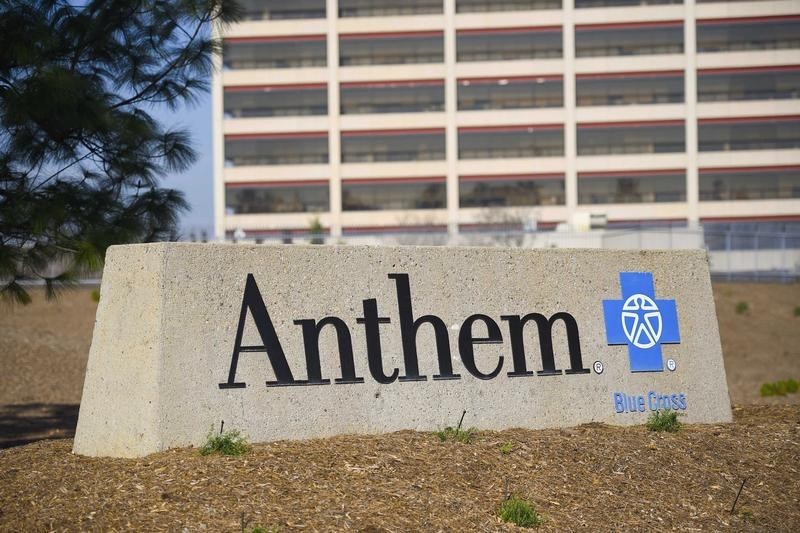Who is Kevin Hassett? Wolfe looks at the Trump ally tipped to become Fed Chair.
By Caroline Humer and Diane Bartz
NEW YORK/WASHINGTON (Reuters) - U.S. health insurer Anthem Inc (N:ANTM) on Monday dismissed concerns that buying smaller competitor Cigna Corp (N:CI) would be considered anti-competitive, even as antitrust experts said the combination would earn regulatory scrutiny.
Any merger could require asset sales and would be complicated by potential deals among other insurers, which after years of change due to President Barack Obama's healthcare reform are now scrambling to tie up.
Insurers are seeking to use scale to trim administrative costs and negotiate lower prices with doctors, moves they say will make plans more affordable but which regulators will closely scrutinize for the opposite effect on consumers.
Besides the possible Anthem deal, Humana Inc (N:HUM) is considering a sale, possibly to Cigna or Aetna Inc (N:AET), a source familiar with the situation previously told Reuters. The Wall Street Journal also reported that UnitedHealth Group Inc (N:UNH) was interested in Aetna.
The U.S. Department of Justice will look at how the proposed combinations - with deal values estimated in the tens of billions of dollars - would increase market share in each county or region for each type of health insurance plan that the companies offer, antitrust experts say.
If two deals were announced in the insurance industry, that would likely trigger more scrutiny from antitrust enforcers, said Barak Richman, who teaches at Duke University School of Law.
"The economics of the health insurance market makes it a complicated analysis. These are not doomed transactions," Richman said.
The Justice Department has been aggressive, one expert said, pointing to Comcast (NASDAQ:CMCSA)'s failed bid for Time Warner Cable (NYSE:TWC).
It would likely be concerned if the number of competitors in the product market of any county dropped to three or fewer, said Andre Barlow, a Justice Department veteran now at Doyle, Barlow and Mazard PLLC.
"Any time you're down to two players or less you have a problem that needs to be resolved," said Barlow. "Three, you may still have to divest."
The mergers of the No. 2 insurer with the No. 5 insurer, and the No. 3 with the No. 4 insurer, could spark a change in the way they review deals, he said.
"There's no guarantee that they would review transactions within an industry similar to how they've treated them in the past," Barlow said.
Anthem, which runs Blue Cross Blue Shield plans in 14 states, disclosed on Saturday that it had offered to buy Cigna for $47 billion but said the deal was held up over issues like the role of Cigna's CEO at the merged company.
Cigna on Sunday confirmed rejecting the offer, citing its own concerns about Anthem's management and saying the combination would run afoul of the rules governing members of the Blue Cross Blue Shield Association.
The Blue Cross Blue Shield Association is made up of 37 different health plans, of which Anthem is the largest, who work together to create a national network of health insurance coverage.
"We believe there is a consensus of where there is overlap between our companies and that no substantive antitrust or insurance regulatory issues are present that would prevent completion of the transaction," Anthem CEO Joseph Swedish said Monday.
By most measures, U.S. insurance markets are extremely concentrated. Using a measure called the Herfindahl-Hirschman Index, which defines a "highly concentrated" market as over 2,500 points, the U.S. market for small group insurance is 3,841 and 4,038 for large groups, according to the Kaiser Family Foundation.
Kaiser Family Foundation data of insurers in the large-group and small-group market show that in no instance is Aetna and Humana in the top three in any state. Anthem and Cigna overlap in just one state - New Hampshire, where their combined share for large groups is 67 percent.
Both Aetna and Humana are in nine states in Medicare Advantage. Combined, they would have market share of 88 percent in Kansas, 80 percent in West Virginia, 58 percent in Iowa and 51 percent in Missouri.
Anthem and Cigna are not the top three providers in any state for Medicare Advantage but do overlap in counties in a handful of states.
"The insurers don't compete the way they should and premiums are higher than they should be," said Leemore Dafny, an expert on the insurance industry at the Kellogg School of Management at Northwestern University. "If past is prologue, insurance consolidation is unlikely to lead to lower premiums. In fact the contrary is true."
Cigna shares rose 4.7 percent to $162.60 while Anthem added 3.6 percent at $171.04.
